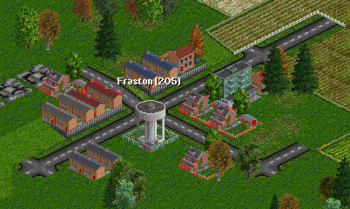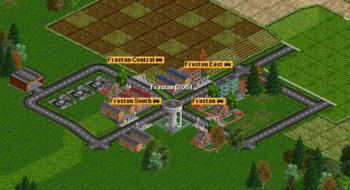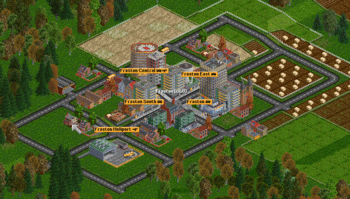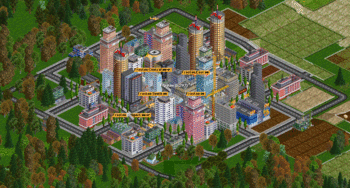Difference between revisions of "User:Tneo/City-grow-guide"
From #openttdcoop wiki
(fixed headlines) |
m (typo's) |
||
| Line 1: | Line 1: | ||
In some games it is needed to let a city grow to suite your needs. This is mostly done to drop goods or food, but in some games it is needed to let cities grow to transport passengers. There are a few things to think about when making a city grow. The following will make sure that your city will grow happily. | In some games it is needed to let a city grow to suite your needs. This is mostly done to drop goods or food, but in some games it is needed to let cities grow to transport passengers. There are a few things to think about when making a city grow. The following will make sure that your city will grow happily. | ||
| − | * Build 2 up to 5 | + | * Build 2 up to 5 stations and place these stations "inside" the gray paved road area of the city-center. This can be a road vehicle or train station, whatever you prefer. |
* Service these stations frequently (as in once a month) and growth is encouraged. (Frequently servicing doesn't necessarily mean long trains, just that on a regular basis a pickup occurs.) | * Service these stations frequently (as in once a month) and growth is encouraged. (Frequently servicing doesn't necessarily mean long trains, just that on a regular basis a pickup occurs.) | ||
* Developing the road grid around the city yourself speeds up growth a bit. | * Developing the road grid around the city yourself speeds up growth a bit. | ||
Latest revision as of 08:19, 24 January 2008
In some games it is needed to let a city grow to suite your needs. This is mostly done to drop goods or food, but in some games it is needed to let cities grow to transport passengers. There are a few things to think about when making a city grow. The following will make sure that your city will grow happily.
- Build 2 up to 5 stations and place these stations "inside" the gray paved road area of the city-center. This can be a road vehicle or train station, whatever you prefer.
- Service these stations frequently (as in once a month) and growth is encouraged. (Frequently servicing doesn't necessarily mean long trains, just that on a regular basis a pickup occurs.)
- Developing the road grid around the city yourself speeds up growth a bit.
- Helicopters give an extra impuls to city growth and can be very useful doing so.
Things to keep in mind:
- Only the first 5 stations speed up growth, all others just generate extra passengers.
- You might want to extend the station spread (later in the game). When extending a station, make sure that the tile with the station name remains in the city center.
Climate specific conditions:
- Temperate has no specific conditions, only goods can let the town grow faster. But total amount of passengers delivered to the town has the most impact.
- In artic games, where the city tile is above snow-level need montly food supply to grow. Food must be delivered before a passenger service will have impact on growth.
- Towns in tropical games, desert towns need water and food to grow. Non-desert towns require neither food nor water. Water needs to be delivered to a water tower (you might want to build one). Any amount of water satifies the need for water for that month. Excessive water supply does not increase the rate of growth, unlike food. Make sure to deliver it at least once a month food and (/ or) water.
Screenshots
(3x3 Road grid was development)



